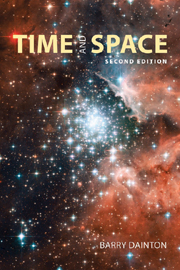Book contents
- Frontmatter
- Contents
- Preface to the second edition
- Preface to the first edition
- 1 Preliminaries
- 2 McTaggart on time's unreality
- 3 The Block universe
- 4 Asymmetries within time
- 5 Tensed time
- 6 Dynamic time
- 7 Time and consciousness
- 8 Time travel
- 9 Conceptions of void
- 10 Space: the classical debate
- 11 Absolute motion
- 12 Motion in spacetime
- 13 Curved space
- 14 Tangible space
- 15 Spatial anti-realism
- 16 Zeno and the continuum I
- 17 Zeno and the continuum II
- 18 Special relativity
- 19 Relativity and reality
- 20 General relativity
- 21 Spacetime metaphysics
- 22 Strings
- Notes
- Glossary
- Web resources
- Bibliography
- Index
7 - Time and consciousness
- Frontmatter
- Contents
- Preface to the second edition
- Preface to the first edition
- 1 Preliminaries
- 2 McTaggart on time's unreality
- 3 The Block universe
- 4 Asymmetries within time
- 5 Tensed time
- 6 Dynamic time
- 7 Time and consciousness
- 8 Time travel
- 9 Conceptions of void
- 10 Space: the classical debate
- 11 Absolute motion
- 12 Motion in spacetime
- 13 Curved space
- 14 Tangible space
- 15 Spatial anti-realism
- 16 Zeno and the continuum I
- 17 Zeno and the continuum II
- 18 Special relativity
- 19 Relativity and reality
- 20 General relativity
- 21 Spacetime metaphysics
- 22 Strings
- Notes
- Glossary
- Web resources
- Bibliography
- Index
Summary
The micro-phenomenology of time
In this chapter I redeem a pledge made in §3.2 and take a closer look at our experience of time. I will not be concerned with what we believe and feel about time and its passing at different stages of our lives; my focus will be on the character of our experience from moment to moment within our streams of consciousness. My approach will be phenomenological: the task is the tightly circumscribed one of trying to formulate a description of our short-term experience of time that is clear, accurate and intelligible. Other interesting problems, such as how our brains manage to perform the impressive feat of integrating the inputs from our different senses to produce a real-time representation of our usually changing surroundings (the typical time-lag between initial stimulation and experience is under half a second) will be ignored.
The micro-phenomenological topic is of interest in its own right – arriving at a clear account of the temporal features of conscious experience is a non-trivial task – but it may also have wider implications, for it may well be that our experience of time reveals something (if not everything) about the nature of time itself. Of particular interest here is the B-theory. Many have voiced the suspicion that time as manifest in consciousness possesses dynamic features that cannot be explained with the resources available to the Block theorist:
Should we simply shrug the human experience of time aside as a matter solely for psychologists?[…]
- Type
- Chapter
- Information
- Time and Space , pp. 103 - 120Publisher: Acumen PublishingPrint publication year: 2010



